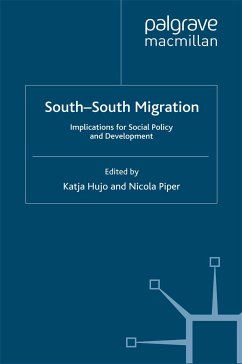
Women Directors (eBook, PDF)
The Italian Way and Beyond

PAYBACK Punkte
36 °P sammeln!





Women Directors analyzes the Italian law on gender quotas in boards as a vital opportunity for the country and a key international case. It provides a broad perspective of the new Italian experience, which has the potential of influencing the way of addressing gender issues worldwide.
Dieser Download kann aus rechtlichen Gründen nur mit Rechnungsadresse in A, B, BG, CY, CZ, D, DK, EW, E, FIN, F, GR, HR, H, IRL, I, LT, L, LR, M, NL, PL, P, R, S, SLO, SK ausgeliefert werden.
Paola Profeta is Associate Professor of Public Economics at Università Bocconi, Italy, where she also coordinates the area of 'Gender' in the Dondena Research Center. She is a member of the monitoring team for Law 120/2011 at the Department of Equal Opportunities (Italian Presidency of Council of Ministries), coordinator of the Bocconi unit for the 'Call of Action' launched by Viviane Reding, scientific advisor of Unicredit and Universities Foundation, and associate editor of CESifo Economic Studies. Her research interests are in public economics, political economics and gender. She has extensively published in leading international journals such as Economic Journal, Economic Policy, European Economic Review and she has written international books. She has coordinated several international projects and organized workshops on the topic of gender equality. She serves as independent director on the board of a listed Italian bank and of a research centre. Livia Amidani Aliberti is Founder of Aliberti Governance Advisors. She supports her clients as Corporate Governance consultant, and serves on listed and charity boards in Italy and the UK. Engaged in gender diversity research since 2004, Livia holds a postgraduate Level 7 Certificate of the FT, is a certified Accountant and holds a BA in Economics and Business. Alessandra Casarico is Associate Professor of Public Economics at Università Bocconi, Italy, and Director ofEconpubblica, Center of Research on the Economics of the Public Sector at Università Bocconi. She is a Research Fellow of CESifo, Munich, Germany. Her main research interests fall in the area of public economics. She has published in international refereed journals such as the Journal of Public Economics, The Economic Journal, The Scandinavian Journal of Economics and she has contributed to books published by national and international editors. Marilisa D'Amico is Full Professor of Constitutional Law and Constitutional Justice at the University of Milan, School of Law, Department of Public Italian and Supranational Law. She is Director of the Division of Constitutional Law. She is also Vice-President of the Council of Presidency of Administrative Justice and barrister before the Supreme Court. She is scientific coordinator of two Specialization courses at the Faculty of Law of the University of Milan: 'Equal Opportunities and Discrimination', 'Women and Corporate governance' ('Corporate governance, rules, meritocracy', Academic Year 2013/2014). Together with Professor Bianca Beccalli, she is also scientific coordinator of the course, 'Women, politics and Institutions. Marilisa was President of the Equal Opportunities Committee at the University of Milan and delegate of the Dean of the University of Milan for Disability. She is the author of more than 10 academic monographs in constitutional law and of several academic papers publishedin prestigious law journals. Anna Puccio is Senior Executive Director for multinational corporations - Microsoft, Procter and Gamble, Sony Ericsson, Accenture - internationally, in countries including the US, Italy, Germany, the UK and Switzerland. She is Secretary General of Accenture Italian Foundation, director of the board of Luxottica Group listed in Italy and Nasdaq, and director of the board of WWF Italy. She is Professor Adjunct in Women's Participation and Leadership in Economic and Political Affairs at the University of Milan, Italy.
Produktdetails
- Verlag: Palgrave Macmillan UK
- Seitenzahl: 211
- Erscheinungstermin: 29. Juli 2014
- Englisch
- ISBN-13: 9781137427489
- Artikelnr.: 41499362
Für dieses Produkt wurde noch keine Bewertung abgegeben. Wir würden uns sehr freuen, wenn du die erste Bewertung schreibst!
Eine Bewertung schreiben
Eine Bewertung schreiben
Andere Kunden interessierten sich für











